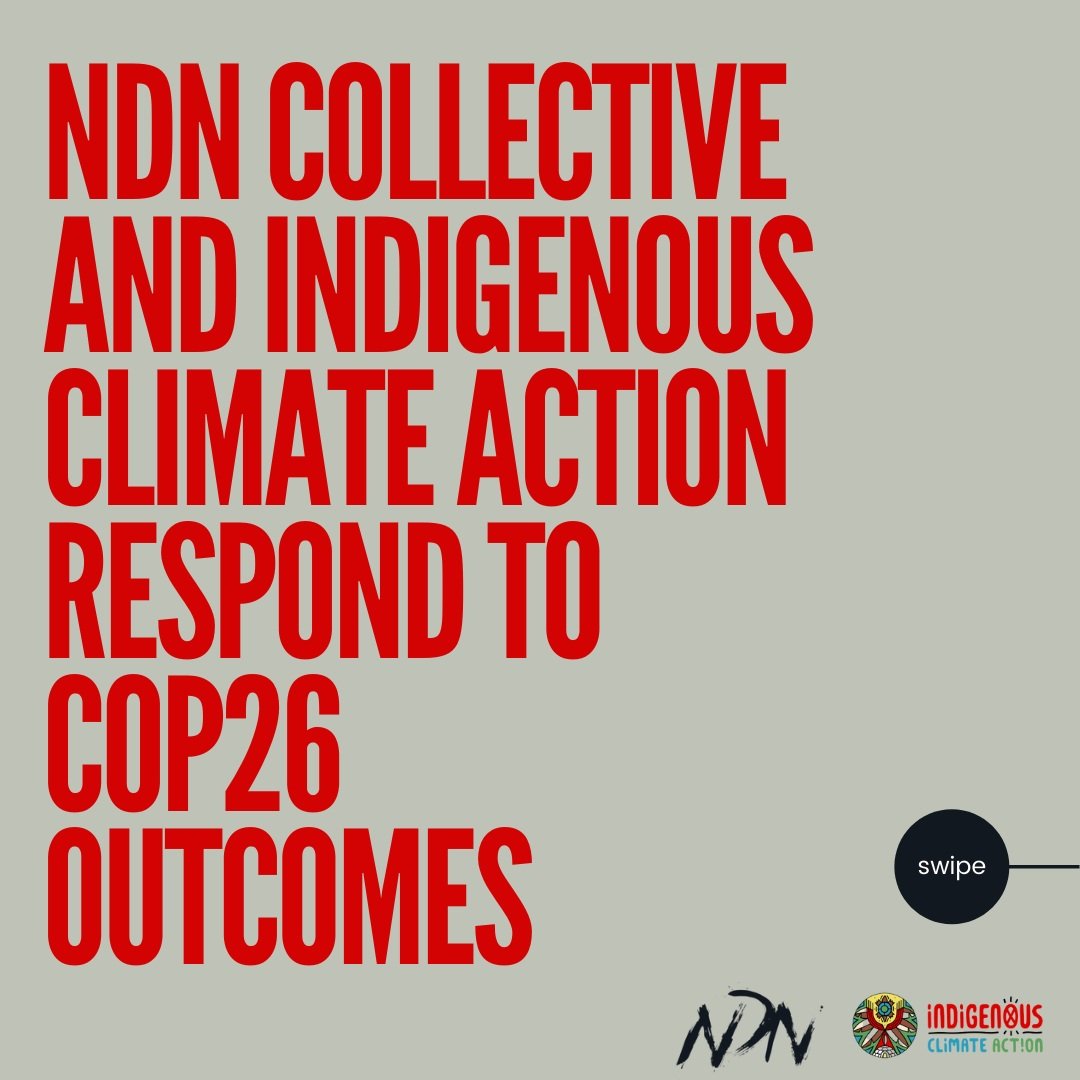COP26 Negotiations Close : NDN Collective and Indigenous Climate Action Respond to Outcomes
Glasgow, Scotland -- Late last night the COP26 deal was struck after nearly two weeks of negotiations and 30 years of talks. In response to the draft agreement that was reached as a result of negotiations, NDN Collective and Indigenous Climate Action released the following statements:
“For over 30 years Indigenous peoples have attended COP negotiations calling for global action on climate that is rooted in our relationship to land and demanding agreements including Human Rights and the Rights of Indigenous Peoples. This year global Indigenous People represented the second largest civil society delegation in attendance, second only to oil and gas lobbyists. Last night as the final language was adopted I couldn’t help but see both our presence and the presence of oil and gas in the outcomes. The final text left me sad, angry, empowered and scared. While we succeeded in getting references to human rights and rights of Indigenous Peoples, it has fallen flat. These references mean little if they are also creating loopholes for dirty corporations and high polluting nations to “offset” their emissions by buying and trading the air and our lands and territories without our consent or participation,” said Eriel Deranger, Executive Director of Indigenous Climate Action. “It’s simply lip service in the name of business as usual if our people do not have power to make decisions for ourselves, participate in the processes, or have mechanisms for grievances. It’s clear governments are unwilling to decouple themselves from corporate interests, that dominated negotiations this year, and that the rights of our communities are nothing more than bargaining chips. For our communities the real work begins when we get home and have to tell our people we didn’t succeed, and that the risks and threats to our people and land will continue, and increase, and that our fight for climate justice still wages on.”
“I want to reframe this moment and lift up the critical and brave climate work led by Indigenous Peoples from across the world. First, we traveled to COP26 against huge barriers. For many of us, we risked our health and in some cases our lives to be here during a pandemic. But we did so because that is precisely what is at risk: life,” said Jade Begay, Climate Justice Campaign Director of NDN Collective. “This year, Indigenous Peoples mobilized our efforts to challenge Article 6 in particular because of its severe implications to our land rights. This article promotes carbon market mechanisms which would open up opportunities for land grabs by corporations and governments. Indigenous Peoples within the Local Communities and Indigenous Peoples Platform made sure that if this Article, which we did not approve of in the first place, remained within the Paris Agreement, it would at least need to include Indigenous rights and human rights. We firmly took the position that we would not accept Article 6 unless it includes specific language respecting Indigenous knowledge, proper consultation with Indigenous Peoples throughout the entirety of any decision making processes and an independent grievance mechanism that holds bad actors accountable. In addition, we saw an investment this year of $1.7 billion for Indigenous-led solutions - this fund is inspired by how Indigenous Peoples have kept ecosystems and biodiversity alive as well as carbon emission down. Lastly, for Native people within the U.S. we experienced a win this year as President Fawn Sharp of the National Congress of American Indians became the first Tribal Leader to join the United States delegation to a UNFCCC Conference of the Parties. Despite this incredible leadership and work to advance equity within the COP, I am perplexed as to why our demands are still not included in the final drafts. These disappointing outcomes, year after year, make me wonder if the COP Presidency and Nation State delegations see Indigenous Peoples as mere decoration rather than key knowledge holders and decision makers. What these outcomes signal to me, especially for those of us working within the U.S., is that we have a great deal of work to do to implement racial equity throughout our all of government climate approach. As we look towards COP27, the U.S. Special Envoy on Climate and U.S. Federal agencies must work to integrate and understand Free Prior and Informed Consent (FPIC), as this is a pathway to get climate policy right both back at home and abroad. What’s more is that if FPIC is not implemented in climate policy we will continue to fail in achieving real climate justice”.
Summary of COP26 outcomes:
False climate solutions such as carbon trading, “nature-based” solutions, carbon capture and storage, and market-based mechanisms negotiated this year are upheld in the final decision document. The rules of Article 6 of the Paris Agreement governing carbon markets remain. Governments and corporations created loopholes, or offset mechanisms, that commodify the air and lands and will contribute to ongoing land theft and violations to human and Indigenous rights and allow emissions to rise.
Indigenous Peoples succeeded in getting language on Indigenous and human rights integrated into Article 6, however, there is no legally binding responsibility to adhere to this language.
Glasgow Climate Pact is the first ever climate deal to explicitly plan to reduce unabated coal, meaning coal-burning done without any carbon capture or storage. While this is a step in the right direction, we need a complete phase-out of all coal and fossil fuel subsidies to keep global temperatures below 1.5C.
World leaders from over 100 countries also promised to stop deforestation by 2030. Our critique here is that 2030 is not urgent enough. We need to end deforestation now.
A planned scheme to cut 30% of current methane emissions by 2030, confirmed by over 100 countries.
450 financial organisations, with shared financial control of $130 trillion, have agreed to back technology such as renewable energy and financing away from fossil fuels.
###




